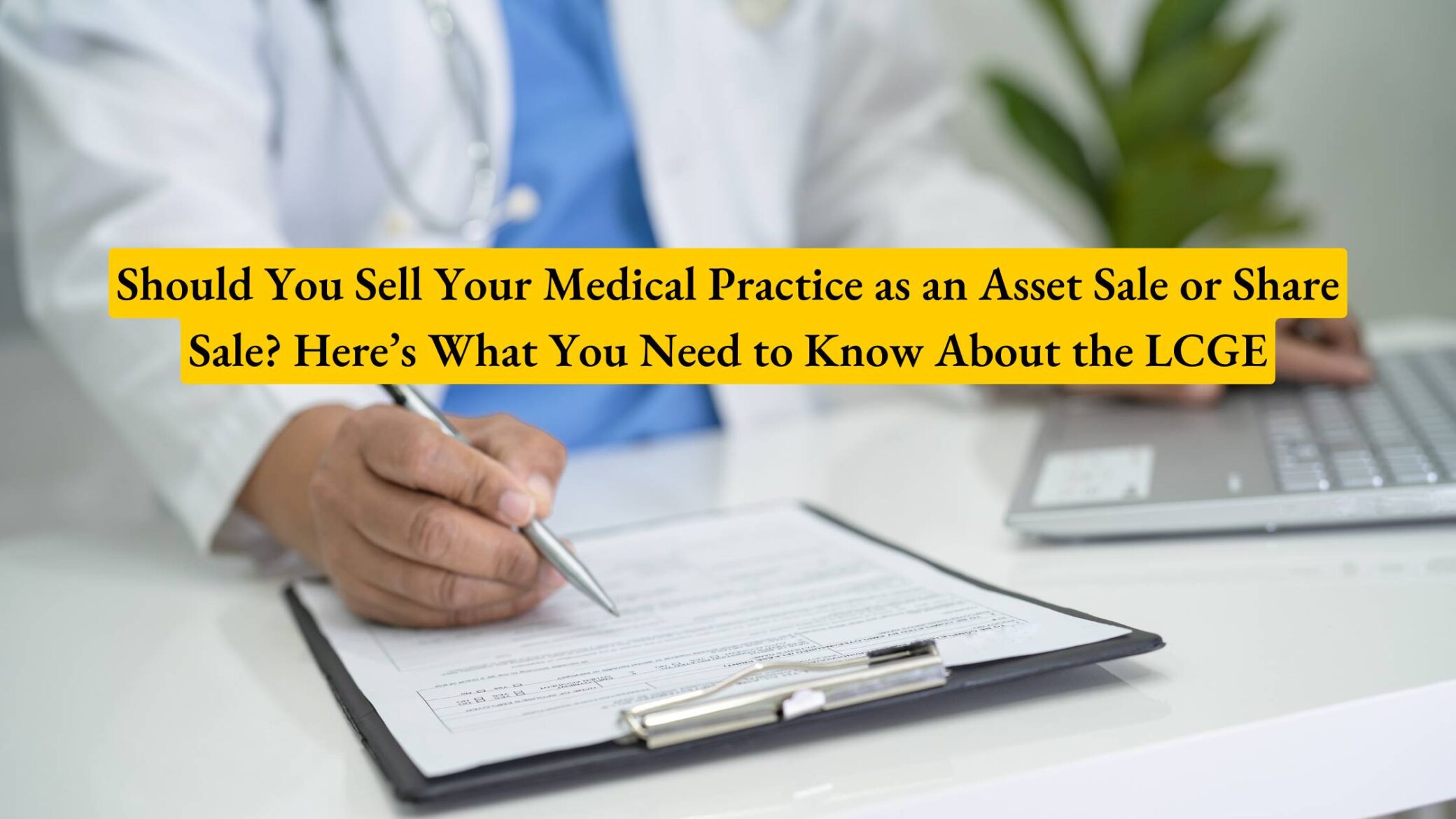If you’re a medical professional thinking about selling your practice, you’re likely encountering a web of tax, legal, and financial considerations. One of the most critical choices you will face is whether to pursue an asset sale or a share sale. Let’s explore these two sale types, why they matter, and how you can leverage Canada’s Lifetime Capital Gains Exemption (LCGE) to maximize the financial return on your sale.
Asset Sale vs. Share Sale: What’s the Difference?
An asset sale involves selling the tangible and intangible assets of your practice, such as equipment, client lists, and goodwill. On the other hand, a share sale transfers ownership of the entire corporation, including both its assets and liabilities.
From the buyer’s perspective:
- Asset sales are preferred because buyers can step up the asset values to fair market value and depreciate them, creating future tax savings.
- Buyers avoid inheriting existing or potential liabilities such as pending lawsuits, lease obligations, or off-balance-sheet risks.
From the seller’s perspective:
- Share sales are preferable, as they provide a cleaner exit—all assets and liabilities transfer, and the seller walks away.
- Share sales open the door to significant tax advantages via the LCGE.
How do I access the Lifetime Capital Gains Exemption (LCGE)?
The LCGE allows Canadian taxpayers to shelter a portion of capital gains from tax upon the sale of qualifying shares. As of the latest update, the exemption has been increased to $1.25 million per individual.
Here’s how it works: If you originally purchased shares in your corporation (or professional corporation) for a nominal amount and later sold those shares for $2 million, the capital gain would be approximately $2 million. Without the LCGE, only 50% of this gain would be taxable. However, with the LCGE, the first $1.25 million can be entirely exempt from Part 1 federal tax (Note: Alternative Minimum Tax may still apply).
How do I qualify for the LCGE?
To benefit from the LCGE, your shares must meet the criteria of Qualified Small Business Corporation Shares (QSBC):
- Canadian-Controlled Private Corporation (CCPC): Your corporation must be Canadian-controlled and not foreign-owned.
- Two-Year Holding Period: Shares must have been owned by you or a related party for at least 24 months.
- 50% Rule: For the 24 months prior to sale, more than 50% of the fair market value of the net assets of your company must have been used in active business.
- 90% Rule at Sale: At the time of sale, more than 90% of the fair market value of the net assets of your company must have been used in active business.
What are common things that jeopardize access to the LCGE?
- Accumulating too much investment income or passive assets in your corporation, which can disqualify you.
- Failing to meet the two-year holding period.
- Losing CCPC status due to foreign residency or ownership.
How do I purify my company to ensure I can access the LCGE
“Purification” refers to removing passive assets from your corporation to meet the 50% and 90% active asset thresholds. Strategies include:
- Transferring excess cash to a holding company (where permitted).
- Investing in whole life insurance or individual pension plans.
- Maximizing RRSP contributions.
Note: Professional corporations are often restricted by college rules on ownership structures. Alberta doctors, for example, may not be able to use holding companies, so tailor your approach accordingly.
Can I multiply the LCGE with my family members?
In non-restricted industries, a family trust and other family members can own shares in a corporation, allowing multiple family members to claim the LCGE and shelter millions in gains. Though this is more complex for professionals due to college rules, it can be possible to plan and structure properly.
When Things Go Wrong: A Cautionary Tale
In one case, a rural doctor who had previously become a U.S. resident lost CCPC status and became ineligible for the LCGE. The sale still went through, but he missed out on a quarter-million dollars in tax savings. In another instance, a doctor had too much investment income in their corporation, only realizing the issue at closing, resulting in a lost exemption.
Plan Early and Get Expert Advice
Selling your practice is one of the most important financial decisions you’ll ever make. The difference between an asset and share sale can have six-figure tax consequences. Engaging knowledgeable tax advisors, chartered business valuators, and legal counsel early on can make all the difference.
Need Help? Whether you’re a doctor, optometrist, or chiropractor, our team can guide you through every step of preparing for sale, qualifying for the LCGE, and structuring your deal to maximize your financial return.
Reach out today to begin your journey toward a financially optimized exit.

